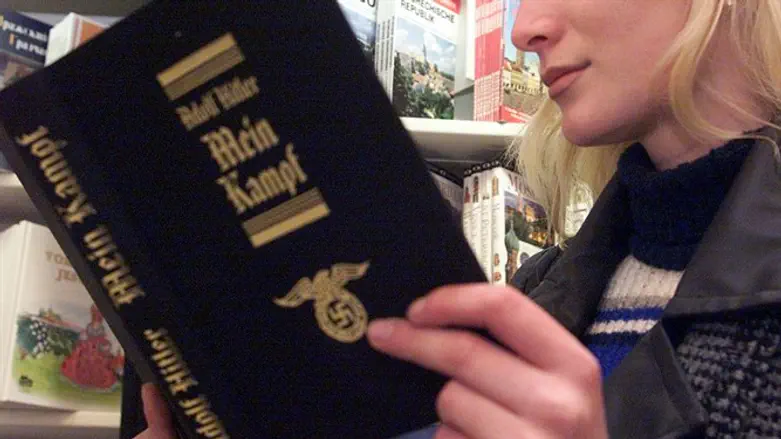
Amazon has banned the sale of most editions of Adolf Hitler’s “Mein Kampf” and other Nazi propaganda books from its store following decades of campaigning by Holocaust charities, The Guardian reported on Monday.
According to the report, booksellers were informed in recent days that they would no longer be allowed to sell a number of Nazi-authored books on the website including Hitler’s autobiographical screed and children’s books designed to spread anti-Semitic ideas among children.
In one email seen by The Guardian, individuals selling secondhand copies of “Mein Kampf” on the service have been told by Amazon that “they can no longer offer this book” as it breaks the website’s code of conduct.
The ban impacts the main editions of “Mein Kampf” produced by mainstream publishers such as London-based Random House and India’s Jaico, for whom it has become an unlikely bestseller.
While leading Holocaust education charities and Jewish groups have campaigned to stop Amazon from selling copies of the Nazi leader’s book, the retailer had traditionally defended the right of free speech and the need for students to understand Hitler’s thinking when it comes to selling a book which is legal to publish.
Dozens of cheap Kindle eBook editions of Mein Kampf have also been deleted from Amazon’s listings, along with Hitler’s Amazon author page, which encouraged individuals to follow for author updates and for information on new releases, according to The Guardian.
Hitler wrote the book in 1924 while in jail for treason after his failed takeover of the Bavarian state government.
The inflammatory tract sets out the political doctrine he enacted as Fuehrer: annexing neighboring countries to gain "Lebensraum" or "living space" for Germans, and his hatred of Jews, which led to the Holocaust.
New copies of Mein Kampf were printed in Germany in 2016 for the first time since World War II, unsettling some Jewish community leaders, after its copyright expired.
For 70 years, Bavarian authorities had refused to allow it to be republished out of respect for victims of the Nazis and to prevent incitement of hatred.
In February 2014, two rare copies of "Mein Kampf" signed by a young Hitler sold at auction in Los Angeles for $64,850.
Two years later, a copy of the book owned by the Nazi leader himself and found in his Munich apartment sold for $20,655 in the United States.
A spokesperson for Amazon would not comment on what had prompted the effective ban on “Mein Kampf”.
“As a bookseller, we provide customers with access to a variety of viewpoints, including titles that serve an important educational role in understanding and preventing antisemitism. All retailers make decisions about what selection they choose to offer and we do not take selection decisions lightly,” said the spokesperson.
The decision on “Mein Kampf” comes several weeks after Amazon stopped sales of some books following protests that the titles, including some for children, were Nazi-era "propaganda".
Among the books is an anti-Semitic children's book titled "The Poisonous Mushroom" authored by Nazi party member Julius Streicher and originally published in 1938.
Amazon has in the past been criticized for offering anti-Semitic items on its website. In July of last year, the Central Council of Jews in Germany denounced the online retail giant for allowing the sale of anti-Semitic books and pro-Nazi merchandise.
In 2018, the website removed items with Nazi or white supremacist symbols from its website after criticism from advocacy groups.
Previously, Amazon removed books that deny the Holocaust from online stores in countries where Holocaust denial is illegal, though it was subsequently reported that they remain available in the United States and the United Kingdom.
